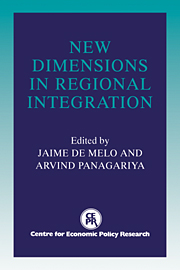Book contents
- Frontmatter
- Contents
- List of figures
- List of tables
- Preface
- Foreword
- Acknowledgements
- List of conference participants
- PART ONE SYSTEMIC ISSUES
- 1 Introduction
- 2 Regionalism and multilateralism: an overview
- Discussion
- 3 Regionalism versus multilateralism: analytical notes
- Discussion
- 4 Multilateral and bilateral trade policies in the world trading system: an historical perspective
- Discussion
- 5 GATT's influence on regional arrangements
- Discussion
- PART TWO COUNTRY ISSUES
- Index
Discussion
Published online by Cambridge University Press: 04 May 2010
- Frontmatter
- Contents
- List of figures
- List of tables
- Preface
- Foreword
- Acknowledgements
- List of conference participants
- PART ONE SYSTEMIC ISSUES
- 1 Introduction
- 2 Regionalism and multilateralism: an overview
- Discussion
- 3 Regionalism versus multilateralism: analytical notes
- Discussion
- 4 Multilateral and bilateral trade policies in the world trading system: an historical perspective
- Discussion
- 5 GATT's influence on regional arrangements
- Discussion
- PART TWO COUNTRY ISSUES
- Index
Summary
Jagdish Bhagwati in Chapter 2 provides a very perceptive analysis of the possible conflicting and complementary relationships between regionalism and multilateralism. I shall focus on a few of the points he raises, and elaborate somewhat on them.
I want to comment first on the political economy motivations for forming trading blocs. As we know, political as well as economic goals played a major role in the formation of the European Community (EC), and remain today. The founders of the Community believed that, by increasing the degree of economic interdependence among members, both the democratic political institutions and the market-oriented economic institutions of these countries would be strengthened and the likelihood of future military conflicts thereby reduced.
Such political economy motivations have remained an important feature of the Community and are crucial in explaining its success, and especially the continuing expansionary efforts. We saw the importance of these motivations in the decision to bring Spain into the Community as quickly as possible. Economic objections to early membership were swept aside by the argument that it was necessary to move quickly to strengthen the new democratic and market-oriented government of Spain. The rapid merging of East and West Germany is another example where political considerations dominated what was perceived to be the optimum economic pace of integration.
In my view, the political arguments for trading blocs do have strong merits in some instances and the resulting benefits easily dominate economic considerations. In moving from a democracy to an authoritarian form of government, it is generally necessary for the new leaders to bribe key economic groups into accepting the new order by directing significant economic rents to these groups.
Information
- Type
- Chapter
- Information
- New Dimensions in Regional Integration , pp. 51 - 57Publisher: Cambridge University PressPrint publication year: 1993
